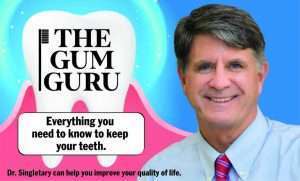 You hear the term “periodontal disease,” and you may know that it refers somehow to the state of health of your gums. But what exactly is periodontal disease?
You hear the term “periodontal disease,” and you may know that it refers somehow to the state of health of your gums. But what exactly is periodontal disease?
Periodontal disease, defined generally, is an inflammatory disease that ravages the hard and soft structures surrounding and supporting the teeth. This inflammation damages gum tissue and bone in particular. There are two types of periodontal disease: dystrophic and non-dystrophic.
Dystrophic Periodontal Disease
Dystrophic periodontal disease, also known as inflammatory gum disease, is caused by the body’s inflammatory response to bacteria that grow in plaque. Plaque is a sticky, colorless substance that clings to the teeth and gums. Without regular brushing and flossing, plaque irritates the structures surrounding the teeth.
Dystrophic periodontal disease can occur regardless of whether your gums are thick or thin. Especially if you have thick gums, plaque causes separation between the teeth and gums. This separation is aptly deemed “pockets” into which more bacteria will accumulate. It is not possible to rid these gum pockets of bacteria without periodontal therapy. Left untreated, gum recession occurs and the teeth become loose. The teeth will ultimately fall out without periodontal care.
Non-dystrophic Periodontal Disease
Non-dystrophic periodontal disease is not typically caused by bacterial infection and inflammation. Of course, bacterial infection can exacerbate the disease. However, the hallmark of non-dystrophic periodontal disease is thin gingival tissue, which speeds up gum recession.
Individuals may possess thin gingival tissue due to genetics. But other factors impact non-dystrophic periodontal disease too. These variables include how hard one brushes the teeth, whether an individual has suffered from food abrasion, whether a person has had braces or other orthodontic work that causes orthodontic movement, and whether one clenches and grinds the teeth.
For individuals with non-dystrophic periodontal disease, it is important to identify the factor(s) that may be intensifying gum recession. Otherwise, gum recession occurs rapidly and can cause lasting damage.
Be on the lookout for signs of gum disease. If you notice bleeding, red, or swollen gums, mobile teeth, or a bad taste lingering in your mouth, you should consult your oral health professional.
Questions? Call North Raleigh Periodontics at (919) 518-8222. We’d love to speak with you!

For more information on this topic, listen to the Gum Guru Podcast by clicking the link below:
